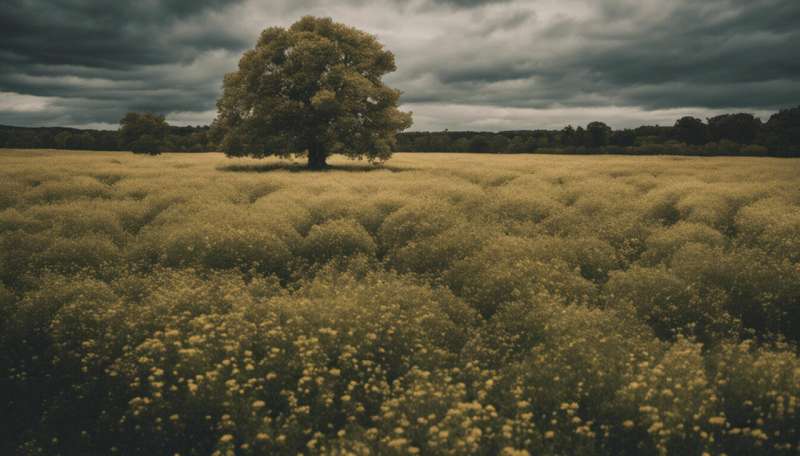Are 'tree-changers' bad at managing their rural properties? A new study wades into the weeds to find the answer

Tree-changers opting for a rural lifestyle can get a bad rap for not managing their properties well. The COVID-19 pandemic prompted more city-based Australians to buy property in the regions. So will this lead to more absentee neighbors who, in the eyes of some, don't know what they're doing?
If you buy rural land, you are buying into a community. You're also expected to take on certain responsibilities, such as managing weeds on the property. This helps both the environment and your neighbors.
Tensions about weeds can be in areas with many tree-changers. Farmers, for example, may think new arrivals don't care about how weeds affect agriculture, creating an "us and them" mentality. But are these perceptions warranted?
Our examined this question. We found almost everyone, including absentee landowners, were concerned about weeds and spent a lot of time managing them. But their motivations for doing so were different. These insights can help communities deal with the threat of invasive plants.
Tree-changers: Friend or foe?
An estimated in Australia are absentee. They might be corporations, Indigenous groups or farmers leasing their land to others. They can also be tree-changers who are generally more interested in rural lifestyles and "getting into nature" than farming the land. This group may visit their properties only on weekends or for holidays.
Of all absentee landowners, tree-changers can readily attract complaints because of the significant changes they bring to the look and culture of rural areas. They often occupy former farmland and may cease farming, engage in conservation work, build new houses or just ride motorbikes all weekend.
Absentee landholders can own vast swathes of land. So the way they manage their properties, including managing weeds, can have big consequences.
Weeds economic and environmental harm. They may lower crop productivity and damage pastures. They can also out-compete native vegetation and disrupt ecosystems.
Weed control methods include herbicides, intensive grazing with goats, or removal by hand or with machinery.
Government agencies absentee landholders can be hard to contact and lack knowledge about weeds. They can also be time-poor and absent at times when weed spraying or removal is most effective.
But requires all landowners to pull their weight. People can feel their efforts are wasted if neighbors do little.
In places such as the Southern Tablelands in New South Wales, absentee landholders have been for enabling the spread of a noxious weed known as serrated tussock. The species damages pastures and is difficult for stock to digest.
The evidence is mixed
So what does the research say on the matter? One in the United States found absentee owners, as compared with resident owners, were less likely to actively manage their land and had less scientific knowledge.
But another did not identify residential status as a factor in weed management.
In Australia, research tends to note absentee owners as an issue for weed management. One small , however, found absentee landholders in Central West NSW were engaged, interested in collaboration on weed management, and reasonably knowledgeable.
Another found length of ownership was a greater influence on land management than residential status.
Our research aimed to better understand whether absentee land ownership in Australia makes a difference to how weeds were managed.
Our results
Our research focused on the Shoalhaven and Bega Valley in southeastern NSW. These regions have experienced an influx of tree-changers in recent decades. They include towns such as Bega, Bowral, Candelo, Berry, Kangaroo Valley and Nowra.
We surveyed 439 landowners about their behaviors and attitudes toward weeds and their management. We then compared the responses of residential owners (88% of respondents) and absentee landowners (12%). We excluded responses from farmers and focused on "lifestylers," which are themselves a significant group.
Both groups said weeds negatively affected them due to how they looked and the environmental damage they caused. Similar proportions of each group were trying to eradicate or control weeds.
Almost everyone was concerned about weeds. Both groups said weed management was a priority and said being a good neighbor was a primary motivation for taking action.
An overwhelming number of people in both groups managed weeds (and spent one to five hours per week doing so). One of the few significant differences between the groups was that residential landowners prioritized weeds that damaged agriculture, while absentee landowners prioritized weeds that threatened the environment.
This shows how values and interests, rather than indifference, shapes attitudes to weed management.
Look beyond where people live
Weed management is determined by our varying with the land. This must be recognized in both research and policy.
Landowners are diverse and own land for a variety of reasons. Our approach to weed management should take account of these differences. Absenteeism is just one part of the puzzle—and perhaps not as important as we might think.
More research is needed. This should involve in-depth case studies to tease out the issues underpinning community tensions about weed management and identify common ground. Then, we can develop steps towards more effective weed management across fence lines.
Provided by The Conversation
This article is republished from under a Creative Commons license. Read the .![]()




















